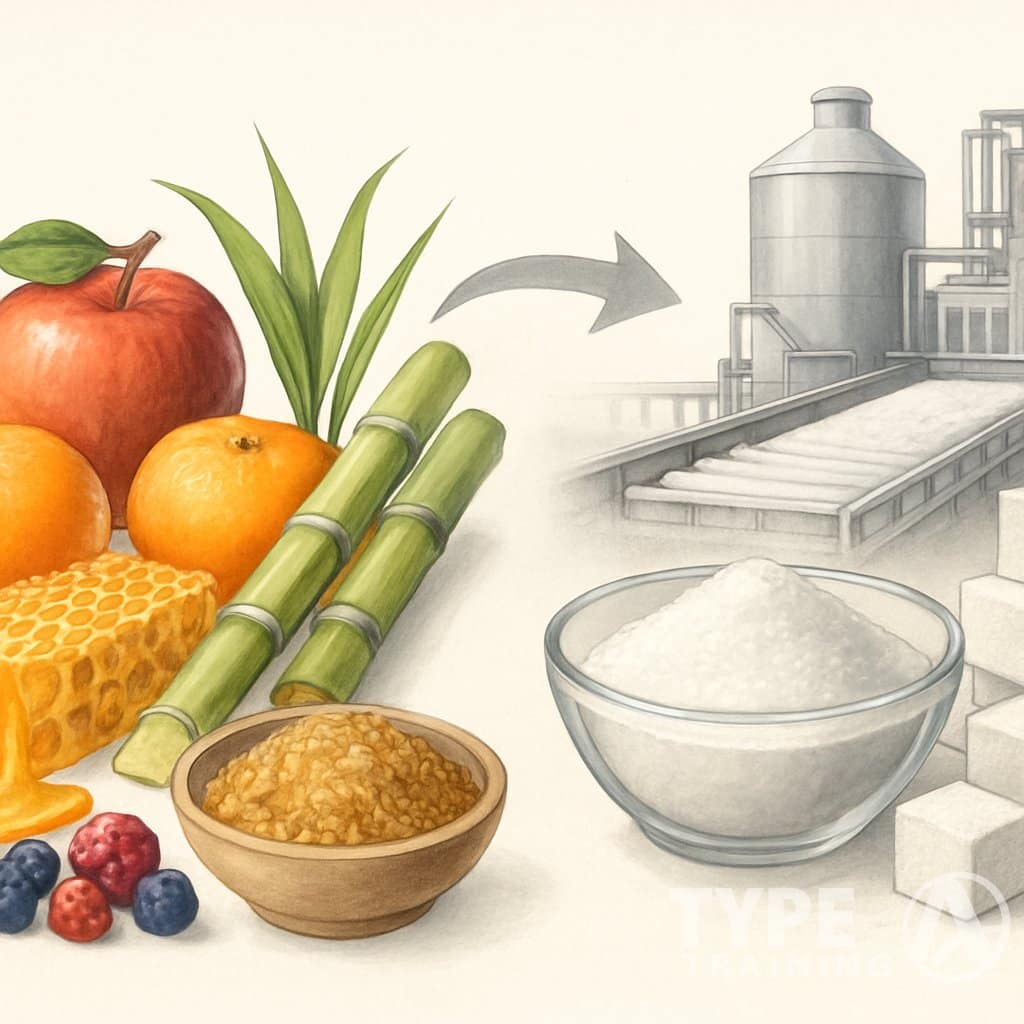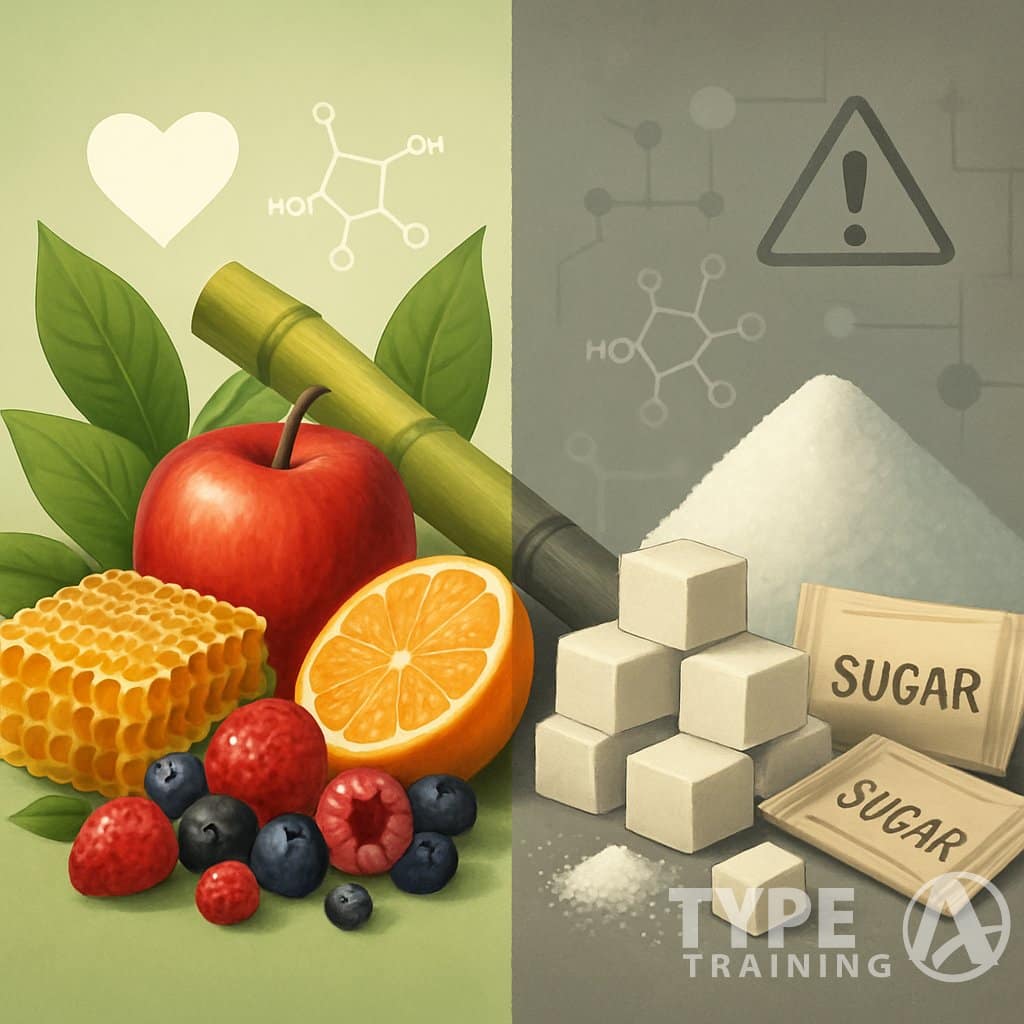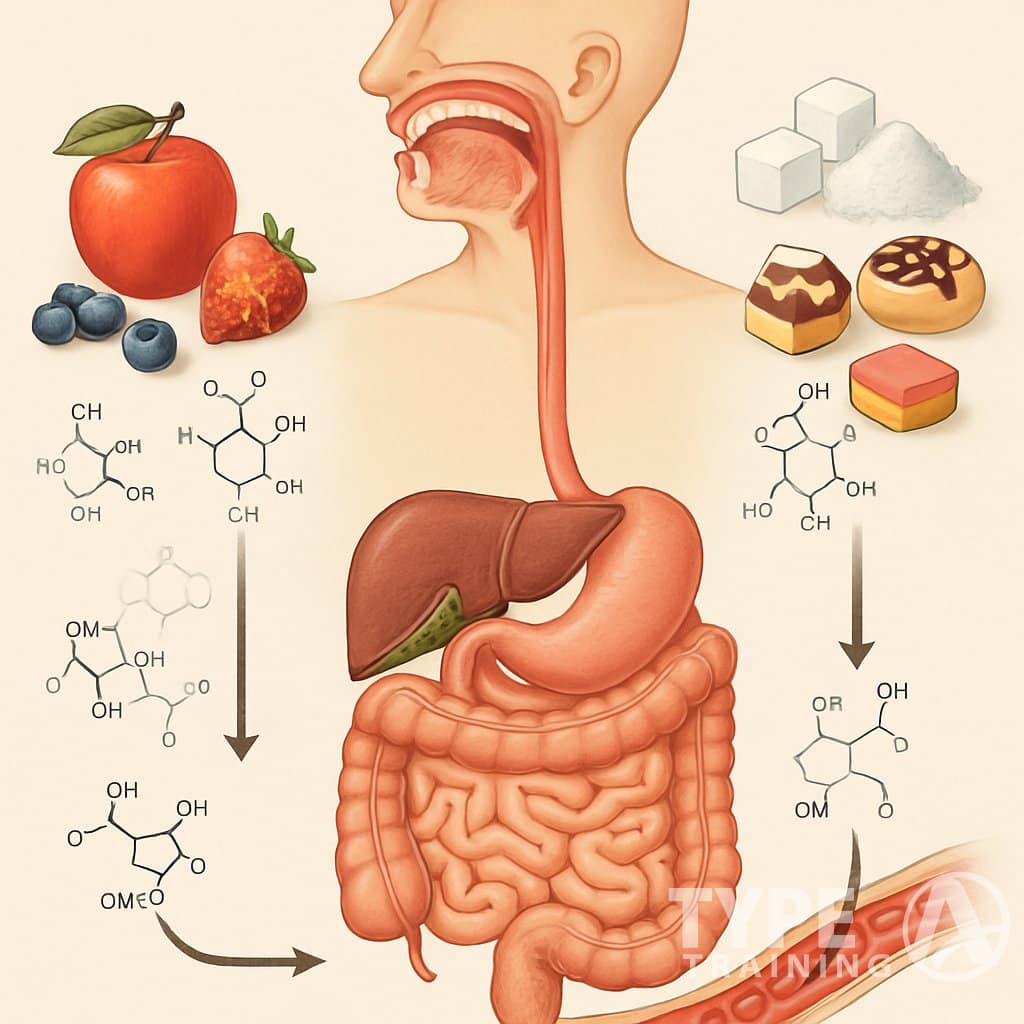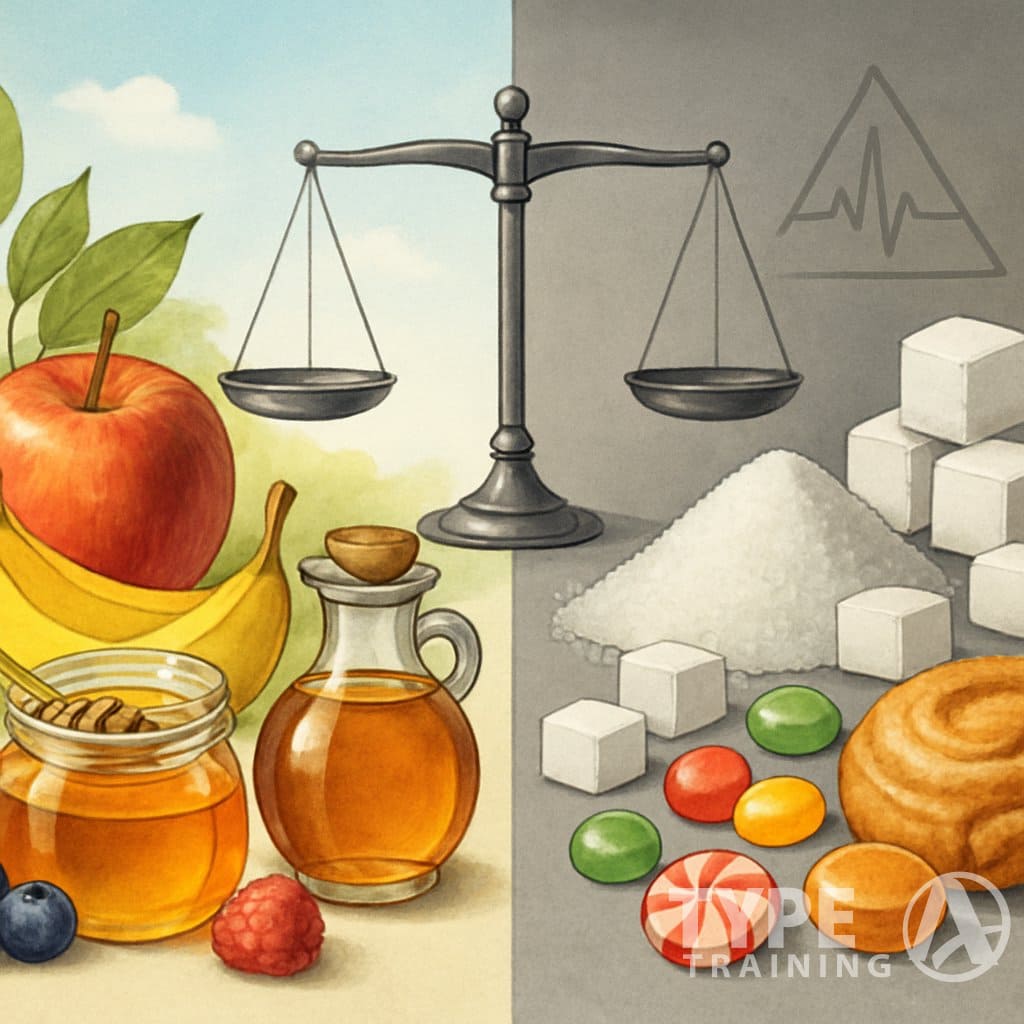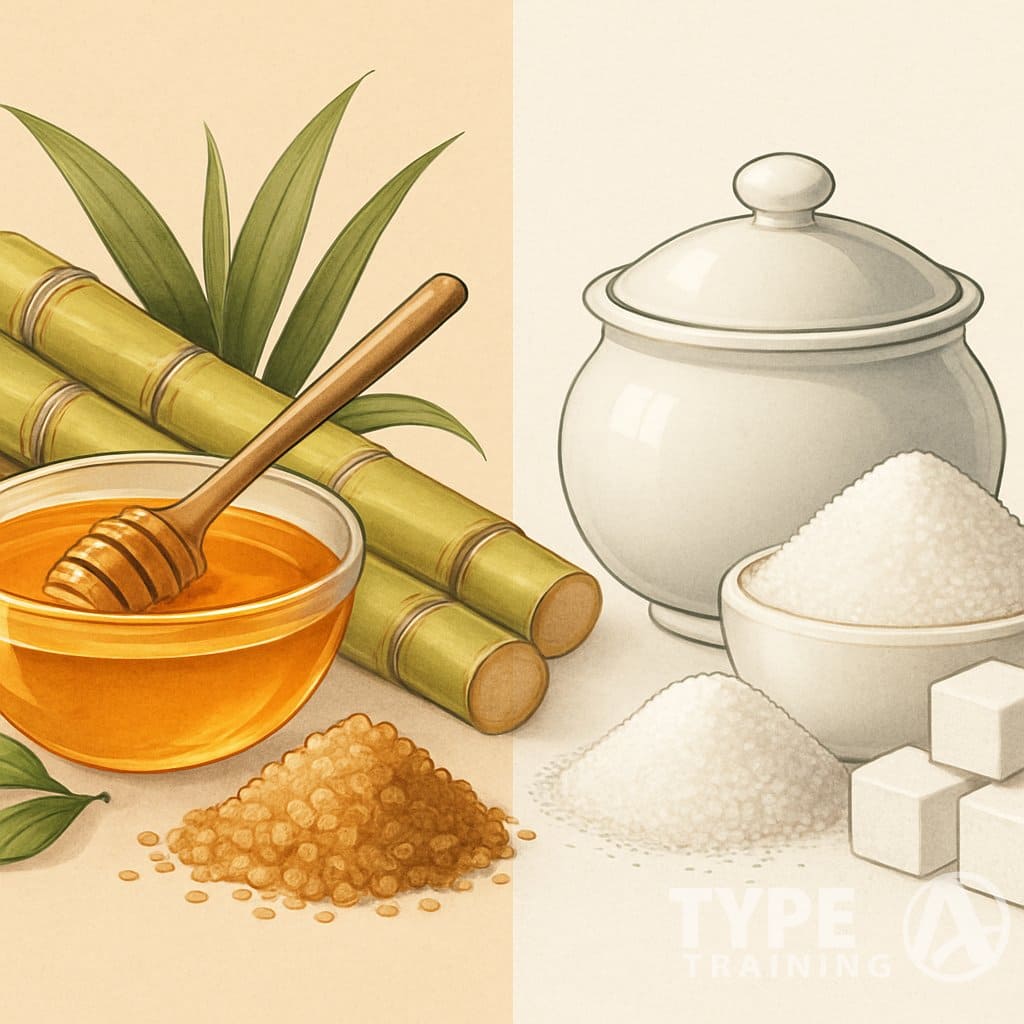When you grab a piece of fruit or reach for a candy bar, you’re eating sugar. But not all sugars are the same.
Understanding the differences between Natural vs Refined Sugar is crucial for making healthier dietary choices.
The big difference? It’s all about how much processing the sugar’s gone through and what other nutrients tag along for the ride.
Natural vs Refined Sugar can impact your health significantly, so knowing which to choose matters.
Popular posts:
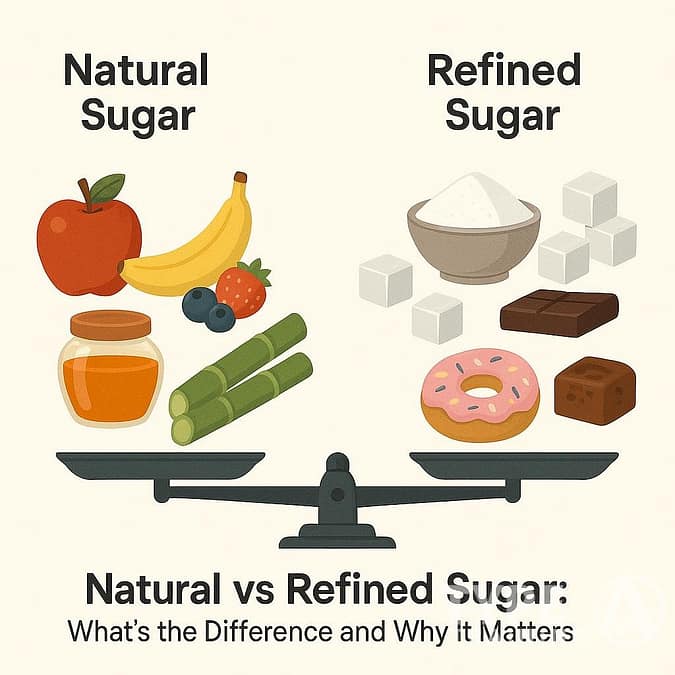
Natural sugars show up in whole foods like fruits, veggies, and dairy. These foods bring fiber, vitamins, and minerals that help slow down how your body absorbs sugar.
When considering Natural vs Refined Sugar, remember that whole foods offer more benefits.
Refined sugars, though, lose all that good stuff during processing. You’re left with pure sugar that your body soaks up fast.
- Natural sugars come with fiber and nutrients that slow absorption, while refined sugars are processed and stripped of beneficial compounds
- Your body processes natural and refined sugars differently, with refined sugars causing faster blood sugar spikes
- You can make healthier choices by focusing on whole foods and limiting processed foods with added sugars
Understanding the Differences: Natural vs Refined Sugar
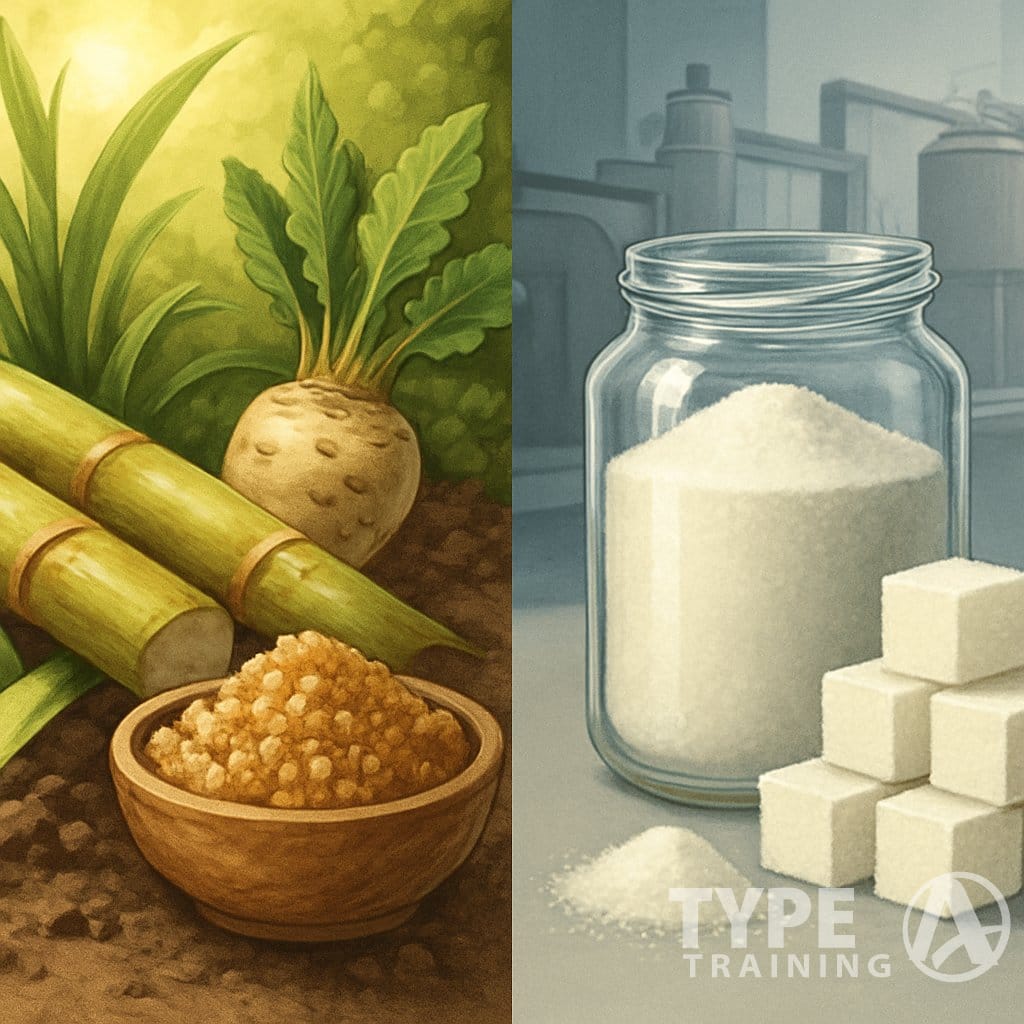
A deeper look into Natural vs Refined Sugar reveals important nutritional differences.
Sugar exists in two main forms, and they affect your body in different ways. Natural sugars come straight from whole foods. Refined sugars get processed and lose their original nutrients.
Natural vs Refined Sugar plays a vital role in understanding how sugars affect your body.
What Is Natural Sugar?
Natural sugar just shows up in foods as they grow—no extra steps needed. Your body gets these sugars along with vitamins, minerals, and fiber that help slow down digestion.
Natural vs Refined Sugar offers insight into how your body utilizes energy from different sources.
Fruits have fructose, plus fiber and antioxidants. For example, an apple has about 19 grams of natural sugar but also packs fiber that helps keep blood sugar steady.
Dairy products like milk and yogurt come with lactose, a natural sugar. These foods also bring protein and calcium to the table.
Vegetables and grains aren’t left out. Sweet potatoes have natural sugars, fiber, and vitamins. Brown rice brings natural sugars plus B vitamins and minerals.
Natural sugars are safe to eat because they come with other nutrients. These nutrients slow down how quickly your body absorbs the sugar.
When evaluating your diet, consider the impact of Natural vs Refined Sugar on your health.
What Is Refined Sugar
Refined sugar goes through a bunch of processing. Everything gets stripped away except the sugar itself.
Understanding Natural vs Refined Sugar helps you make informed decisions about what you eat.
Sugar cane and sugar beets are the main starting points. White table sugar comes from these plants but loses all nutrients along the way.
Refined sugar has been processed so only sugar remains, like granulated sugar from sugar cane or corn syrup from corn. Your body absorbs refined sugar quickly without any nutrients to slow it down.
Added sugar sneaks into tons of processed foods. Companies add it to bread, pasta sauce, and snacks to make them taste better.
This quick absorption causes blood sugar spikes. Over time, those spikes can lead to weight gain and health issues.
Common Sugar Sources
Different foods bring different types of sugar. Knowing which foods have natural or refined sugar helps you make better choices.
Natural Sugar Sources:
- Fresh fruits (apples, oranges, berries)
- Vegetables (carrots, sweet potatoes, beets)
- Dairy products (milk, plain yogurt, cheese)
- Whole grains (brown rice, oats, quinoa)
Refined Sugar Sources:
- White sugar from sugar cane or sugar beets
- Corn syrup and high fructose corn syrup
- Brown sugar (white sugar with molasses added back)
- Powdered sugar
Middle Ground Sources: Honey and maple syrup sit somewhere in between. They have some nutrients but are still pretty concentrated sugars.
Foods with added sugar include bread, pasta sauce, and granola bars. It’s smart to check nutrition labels for hidden added sugar in packaged foods.
Types and Sources of Sugar
Sugar naturally occurs in many foods like fruits, veggies, dairy, and grains. Refined sugars are extracted from natural sources like sugar cane and sugar beets, then turned into white sugar and corn syrup.
Comparing Natural vs Refined Sugar reveals how processing affects nutrient values.
Natural Sugar in Fruits and Vegetables
Fruits have fructose, a natural sugar that comes with fiber and nutrients. Apples, oranges, bananas, and berries all have fructose plus vitamins and minerals your body actually wants.
Natural vs Refined Sugar consumption patterns can influence overall dietary health.
The fiber in fruits slows down how fast your body takes in the sugar. That helps keep blood sugar from spiking like it does with processed foods.
Fresh veggies like sweet potatoes, carrots, and beets also have natural sugars. They bring important nutrients along with their sweetness.
Dried fruits are a special case. The sugar gets concentrated when water is removed, so check labels to make sure extra sugar hasn’t been tossed in during processing.
Sugar in Dairy and Grains
Dairy products have lactose, the natural sugar in milk and cheese. This type of sugar comes with protein that slows down absorption.
Milk, yogurt, and cheese all contain lactose naturally. Plain versions are usually a better bet than flavored ones loaded with added sugars.
Whole grains like brown rice, oats, and quinoa have small amounts of natural sugars. They also bring fiber, protein, and other nutrients to the table.
The mix of nutrients in dairy and grains helps your body process these natural sugars much slower than refined sugar.
The differences in Natural vs Refined Sugar can significantly affect your nutrition.
Common Refined Sugar Products
White sugar and table sugar come from sugar cane or sugar beets that get processed until only sugar is left. No fiber, vitamins, or minerals survive the journey.
Common refined sugar products include:
-
- Granulated white sugar
- Brown sugar (white sugar with molasses added back)
- Corn syrup and high-fructose corn syrup
Being aware of Natural vs Refined Sugar is key to maintaining a balanced diet.
- Powdered sugar
Honey, maple syrup, and molasses fall somewhere in the middle. They come from natural sources but are still concentrated sugars.
Candy, cookies, and cakes are loaded with refined sugar. One candy bar can have 30 grams of added sugar, which is more than most people should eat in a whole day.
Processed foods often sneak in refined sugars. Bread, pasta sauce, and salad dressings may have extra sugar even if they don’t taste sweet at all.
Nutritional Content and Health Implications
Natural sugars bring vitamins, minerals, and fiber your body craves. Refined sugars? They’re just empty calories with no real perks.
Natural vs Refined Sugar impacts your body’s ability to process carbohydrates effectively.
The fiber in natural sugar sources helps keep blood sugar steady and makes you feel full longer. That’s a win for anyone who snacks a lot.
Essential Nutrients in Natural Sugar
When you eat natural sugars from whole foods, you get so much more than just sweetness. Natural sugars come with other nutrients that help your body.
Healthy choices often depend on your understanding of Natural vs Refined Sugar.
Whole fruit gives you vitamin C, potassium, and antioxidants along with natural sugars. An orange, for example, has about 70 mg of vitamin C—almost your whole daily need.
Berries are loaded with antioxidants that help protect your heart and brain. Pretty cool, right?
Dairy products with natural sugars offer calcium and protein. One cup of milk serves up 8 grams of protein and 280 mg of calcium.
Key nutrients in natural sugar sources:
Natural vs Refined Sugar choices should reflect a commitment to overall health.
- Vitamin C in citrus fruits and berries
- Potassium in bananas and melons
- Antioxidants in colorful fruits
- Calcium in dairy products
- B vitamins in whole grains
Empty Calories of Refined Sugar
Refined sugar gives you calories but nothing else. Refined sugar has been processed so only sugar remains.
Incorporating the principles of Natural vs Refined Sugar in daily meals is beneficial.
One candy bar? About 30 grams of added sugar and zero vitamins or minerals. That’s 120 empty calories your body can’t really use.
Table sugar, corn syrup, and white sugar all lack the nutrients found in their original sources. The refining process strips away fiber, vitamins, and minerals.
What refined sugar lacks:
- Fiber to slow digestion
- Vitamins for body functions
- Minerals for bone and muscle health
- Antioxidants for cell protection
- Protein for muscle building
These empty calories can lead to weight gain without giving your body anything it actually needs.
Role of Fiber and Satiety
Dietary fiber in natural sugar sources does a lot for how your body handles sugar. Fiber slows down how quickly sugar is digested.
Eat an apple and you get about 4 grams of fiber. That fiber helps keep your blood sugar from spiking and makes you feel full longer.
Learning more about Natural vs Refined Sugar can help you avoid health risks.
Refined sugar? No fiber at all. It rushes into your bloodstream, spikes your blood sugar, and then leaves you hungry again before you know it.
Fiber benefits:
-
- Slows sugar absorption
Your understanding of Natural vs Refined Sugar can shape your eating habits.
- Prevents blood sugar spikes
- Increases feelings of fullness
- Helps with weight control
- Supports digestive health
One cup of fresh berries brings 8 grams of fiber along with their natural sugars. That mix helps you stay satisfied and gives you a bunch of good nutrients at the same time.
How Your Body Processes Different Sugars
The comparison between Natural vs Refined Sugar highlights their absorption rates.
Your body treats natural and refined sugars pretty differently. The chemical structure and the company they keep (fiber, vitamins, minerals) change how fast you absorb them and how your blood sugar reacts.
Absorption and Metabolism
Natural sugars come with fiber, vitamins, and minerals that slow down digestion. Bite into an apple and your body has to work for that sugar—it’s not a free ride.
Natural sugars digest more slowly thanks to all those extra nutrients. Your digestive system has to handle the whole food first.
Refined sugars like sucrose and glucose just zip right in. No fiber or protein to slow the train down.
Fructose is a bit of a wild card—it mostly gets handled by your liver. The liver can turn it into glucose or stash it away as fat, but too much at once? That’s tough on your liver.
Drink a soda or eat some candy, and the sugar rush hits fast. Your body gets a big dose of sugar in minutes, not hours like with whole foods.
Blood Sugar and Insulin Response
Refined sugars cause sharp spikes in blood sugar levels. Your pancreas has to crank out a lot of insulin in a hurry to deal with the sugar rush.
These rapid spikes and drops can set you up for weight gain and insulin resistance over time. Your body can’t always keep up with all that insulin demand.
Natural sugars? You get a much gentler insulin response. The fiber and nutrients slow things down so your body can absorb the sugar at a steady, manageable pace.
Choosing wisely between Natural vs Refined Sugar is essential for metabolic health.
A piece of fruit might taste just as sweet as candy, but your blood sugar doesn’t go on a rollercoaster. It’s all about how quickly your body can grab that sugar.
If you eat refined sugar all the time, your cells get less sensitive to insulin. That’s a big risk for diabetes and other health issues.
Health Effects of Natural and Refined Sugar
Both natural and refined sugars can lead to weight gain and diabetes if you go overboard. Added sugars bump up your risk of type 2 diabetes and heart disease, while sugars from whole foods usually cause fewer problems.
Both Natural vs Refined Sugar can impact your weight management efforts.
Impact on Weight Gain and Diabetes
Your body processes refined sugars way faster than natural sugars. That quick hit means rapid blood sugar spikes.
Refined sugar sends your blood sugar up in a flash, while natural sugars from fruits and veggies take their time. Fiber in whole foods keeps sugar from rushing in all at once.
Key differences in sugar processing:
- Refined sugars: Fast absorption, quick blood sugar spikes
- Natural sugars: Slower absorption, steadier blood sugar levels
Eat a diet high in added sugars, and your risk for diabetes really goes up. Too much added sugar can lead to type 2 diabetes, no matter where it comes from.
Weight gain happens when you eat more calories than you burn. Refined sugars just add empty calories—no fiber, no real fullness, nothing to help you out there.
Dental Health Considerations
Knowing the difference between Natural vs Refined Sugar can aid in better dental health.
All sugars can mess with your teeth, but refined sugars are the worst. Bacteria in your mouth love sugar and make acid that eats away at your enamel.
Candy, cookies, and cakes have a ton of processed sugar that sticks to your teeth longer than the sugar in fruit. That sticky stuff ups your risk for cavities.
Sugar sources that harm teeth most:
- Sticky candies and gummies
- Sugary drinks like soda
- Sweet baked goods
- Processed snacks
Whole fruits don’t cause as much tooth damage. Fiber in fruit actually helps clean your teeth a bit as you chew, and the sugar isn’t as concentrated as in processed treats.
Connection to Chronic Conditions
How much sugar you eat seriously affects your risk for big health problems. High added sugar intake raises your risk of heart disease, stroke, and fatty liver.
Refined sugars crank up inflammation all over your body. That inflammation can wear down your blood vessels and organs with time.
Major health risks from excess sugar:
Addressing the connection between Natural vs Refined Sugar and chronic conditions is vital.
- Heart disease and stroke
- Fatty liver disease
- High
blood pressure - Obesity
Too much fructose from added sugars overloads your liver and leads to fat building up there. That can turn into serious liver trouble down the road.
You’ll keep your risk lower if you get sugar from whole foods. The nutrients in fruits and veggies help protect you from chronic diseases, even though they have natural sugars too.
Making Healthier Choices with Sugar
Exploring the impact of Natural vs Refined Sugar helps in making healthier food choices.
Learning to read food labels can help you spot hidden sugars in everyday stuff. Natural sweeteners like honey and maple syrup have a little more going for them than plain sugar, but a balanced diet full of whole foods keeps you satisfied way longer.
Incorporating insights about Natural vs Refined Sugar can enhance your diet quality.
Reading Food Labels for Sugar Content
Food labels give you two sugar numbers to check. Total sugars include everything—natural and added.
Added sugars get their own line on nutrition labels. Women should keep added sugar under 25 grams a day, men under 37 grams.
The ingredient list is sneaky—look for anything ending in “-ose” like fructose, glucose, and sucrose.
Common sugar names on labels:
- High fructose corn syrup
- Cane sugar
- Brown rice syrup
- Agave nectar
- Coconut sugar
Compare similar foods to find the ones with less added sugar. Some yogurts have 15 grams of added sugar, which is more than half your daily limit in just one serving.
Choosing Natural Sweeteners
Being informed about Natural vs Refined Sugar can aid in better sweetener choices.
Natural sweeteners offer nutrients that refined sugar just doesn’t have. Honey gives you tiny amounts of vitamins, minerals, and even some antioxidants.
Maple syrup brings manganese and zinc. Dates add fiber and potassium if you use them to sweeten recipes.
Natural sweetener options:
-
- Raw honey – Has enzymes and antioxidants
Natural vs Refined Sugar can be part of a balanced diet when consumed mindfully.
- Dates – Add fiber and sweetness
- Stevia – Zero calories, all from a plant
These sweeteners sit somewhere between natural and refined sugar. Try to use them in smaller amounts than you’d use regular sugar.
Keep in mind, natural sweeteners still count toward your daily added sugar. One tablespoon of honey has about 17 grams of sugar—so go easy.
Tips for a Balanced Diet
Focus on whole foods that naturally come with sugar, fiber, and nutrients. Fruits hit that sweet spot—they bring vitamins and fiber, which actually help you feel full.
Understanding Natural vs Refined Sugar is crucial for overall health management.
Try filling about two-thirds of your plate with veggies, fruits, whole grains, or beans. Then toss in some lean protein like chicken, fish, or tofu for the rest.
Foods that satisfy hunger longer:
- Apples (hello, natural fiber!)
- Greek yogurt (packed with protein)
- Oatmeal (whole grain goodness)
- Nuts and seeds (those healthy fats really help)
Go for foods where sugar comes bundled with other good stuff. For example, an orange gives you vitamin C and fiber, not just sugar.
Try to skip foods where sugar steals the show. Candy and cookies can pack in 30 grams of added sugar in just one serving.
When planning meals, start with protein and veggies. Add fruit for a hit of natural sweetness instead of grabbing processed snacks.
Ultimately, a focus on Natural vs Refined Sugar can lead to a healthier lifestyle.

